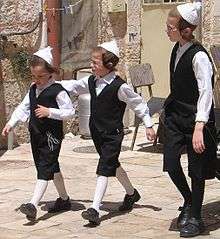Frum
Frum (Yiddish: פֿרום, lit. 'religious', 'pious') is a word that describes Jewish religious devotion.[1] The appellation is generally, but not only, applied to certain movements within Ashkenazic Orthodox Judaism, and used by some members of these groups as a self-reference.[2]

The term connotes the observance of Jewish religious law in a way that often exceeds its bare requirements. This not only includes the careful study of Torah, daily prayers, observing Shabbat and kashrut, and performing deeds of loving-kindness, but also many more customs and khumrot (prohibitions or obligations in Jewish life that exceed the requirements of Halakha).[3][4]
The term frum contrasts with frei (Yiddish and German for 'free'), which describes Jews who are secular or practice non-Orthodox observance, or "free from keeping the ... commandments."[5][6]
Meaning
Frum can be used in a negative sense for 'hypocritically pious', 'holier-than-thou', 'sanctimonious'; or in a positive sense for 'pious', 'devout', 'God-fearing', and 'upright'. The phrase frum and ehrlich captures the positive connotations of these words, to mean roughly 'upright' or 'righteous' (see tzadik).
The question "is s/he frum?" asks whether the person is religious.[3]
Derived terms
In Yinglish, frummer is used both as a noun for 'one who is frum',[7] and as a comparative adjective, i.e. 'more frum'.[8][9] The correct Yiddish comparative form of the adjective is, in fact, frimer.[10][11][12] Frumkeit describes the lifestyle of those who are frum.[7]
Frummer can also have a negative connotation, similar to chasid shoteh ('pious idiot'), which is how the Talmud (Sotah 21B) describes a man who sees a woman drowning, but refuses to save her, and says, "It is not proper to look at her, and rescue her." A frummer in that sense is a person displaying a disproportionate emphasis on technical aspects of religion of one's daily life in a manner which actually violates the halakha in a specific case. (See Pikuach nefesh.) Another term with this meaning is frummie.[7]
A person who is frum from birth was born into a frum household and has remained observant.[2][13][14] This contrasts with a baal teshuva (literally 'master of return'), a Jew who has become frum after a period or lifetime living a non-Orthodox lifestyle.[15][16]
Mode of dress
.jpg)
The New York Times defines the word frum as 'religiously observant'.[13] For boys and men, covering the head is an identifier of religiosity.[17] For women, being frum includes adherence to the laws of tzniut, such as modest dress covering the arms and legs.[18] For married women, a head covering is another indicator.[14]
See also
References
- Josephone Livingstone (April 30, 2018). "Circle of Trust". The New Republic.
- Sarah Bunin Benor (2012). "Becoming Frum". Becoming Frum: How Newcomers Learn the Language and Culture. Rutgers University Press. ISBN 978-0-8135-53894. JSTOR j.ctt5hj7wn.
- Dina Kraft (November 10, 2010). "Rapper Finds Order in Orthodox Judaism in Israel". The New York Times.
- Jason Zinoman (June 13, 2018). "What's So Funny About Orthodox Judaism? This Comic Has One Answer". The New York Times.
- Marjorie Miller (July 25, 1997). "Freier". LATimes.com Los Angeles Times.
- L. Roniger (1992). "From pioneer to freier: the changing models". European Journal of Sociology / Archives Européennes de Sociologie / Europäisches Archiv für Soziologie. 33 (2): 280–307. doi:10.1017/S0003975600006470. JSTOR 23997799.
- Rabbi Julian Sinclair (November 5, 2008). "Frum". The Jewish Chronicle.
- Fried, Heshy (22 June 2011). "Words and statements that make you sound frummer [sic] than you are". Frum Satire. Frum Satire. Retrieved 29 March 2017.
- JewishPress.com Staff (26 March 2017). "Frummer [sic] Than You". The Jewish Press. Retrieved 29 March 2017.
- Kahn, Lily; Rubin, Aaron D., eds. (2016). Handbook of Jewish Languages. Leiden, Netherlands: Koninklijke Brill NV. p. 676. ISBN 9789004297357. Retrieved 29 March 2017.
ו (u) becomes י (i), e. g., פֿרום frum 'Jewishly observant' > פֿרימער frimer 'more Jewishly osbervant'
- Stutchkoff, Nahum (1950). Weinreich, Max (ed.). דער אוצר פון דער יידישער שפראך (Der oytser fun der Yidisher shprakh) (in Yiddish). New York: Yidisher Ṿisenshafṭlekher Insṭiṭuṭ.
די קאַץ איז שוין פֿרימער פֿאַר אים. ('Di kats iz shoyn frimer far im.' — 'A cat is more pious than he is.')
- "פֿרום (Adjective)". Wiktionary. Retrieved 29 March 2017.
- Susan Jo Keller (September 20, 1998). "Seeing the Light". The New York Times.
born in an observant Orthodox family
- Tova Ross (December 10, 2013). "When I got married, my sheitel was a symbol of my vows and my Orthodoxy".
- Rabbi Aaron L. Raskin. "Tzaddik — The Baal Teshuvah". Chabad.org.
- "Laws of Repentance 7:4, citing Berakot, 34b. C. G." Mishneh Torah.
their degree is above .. did not sin, because it is more difficult for them ..
- Sara Levin (April 12, 2019). "Forbes Profiles Modest Fashion Influencers & Other Orthodox Jews in the News".
- Naomi Fry (November 2, 2017). "Modest Dressing, as a Virtue". NYTimes.com.
ankle-lengthed, high-necked and voluminous-sleeved .. long-sleeved, high-collared